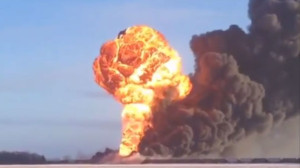After several major accidents involving crude oil trains derailing and exploding, the National Transportation Safety Board [NTSB] is warning that “major loss of life” could result from an accident if tougher regulations on oil-by-rail shipments are not implemented.
The NTSB’s recommendations were echoed by the Transportation Safety Board of Canada. Regulators in both countries are urging their governments to adopt stricter rules.
The NTSB’s recommendations on Thursday came just days after a train derailed in Philadelphia, and just weeks after a train exploded in North Dakota. These two accidents are just the latest in a string of accidents that have happened over the last seven months, the worst killing 47 people in Canada.
“The NTSB is concerned that major loss of life, property damage and environmental consequences can occur when large volumes of crude oil or other flammable liquids are transported on a single train involved in an accident,” said the NTSB in a press release. “Crude oil shipments by rail have increased by over 400 percent since 2005.”
Philadelphia had a close call on Monday when seven of the train’s 101 cars slide off the rails – including tankers carrying oil from North Dakota – on a bridge over the Schuylkill River, a tributary of the Delaware River. Luckily none of the oil spilled out, but other communities across the United States and Canada have not been so lucky.
Last July, a runaway train carrying Bakken crude oil derailed and exploded in the center of the Quebec town of Lac-Magantic, killing 47 and destroying 30 buildings.
Last November, 30 cars of another 90-car train carrying Bakken crude derailed in rural Alabama, sending more than a dozen of the cars into flames before being extinguished several days later. No one was injured or killed in this accident.
On December 30th, a train carrying crude oil from the Bakken shale derailed outside of Casselton, North Dakota. Residents reported several loud explosions that sent huge fireballs into the sky. Authorities urged residents within five miles of the explosion to evacuate and avoid contact with the smoke, while residents living 10 miles away were asked to stay indoors.
The common theme between all of these accidents is that they were all carrying crude oil from the Bakken shale formation. The Pipeline Hazardous Material Safety Administration [PHMSA] issued a safety alert earlier this month warning that “crude oil being transported from the Bakken region may be more flammable than traditional heavy crude oil.”
(more…)



